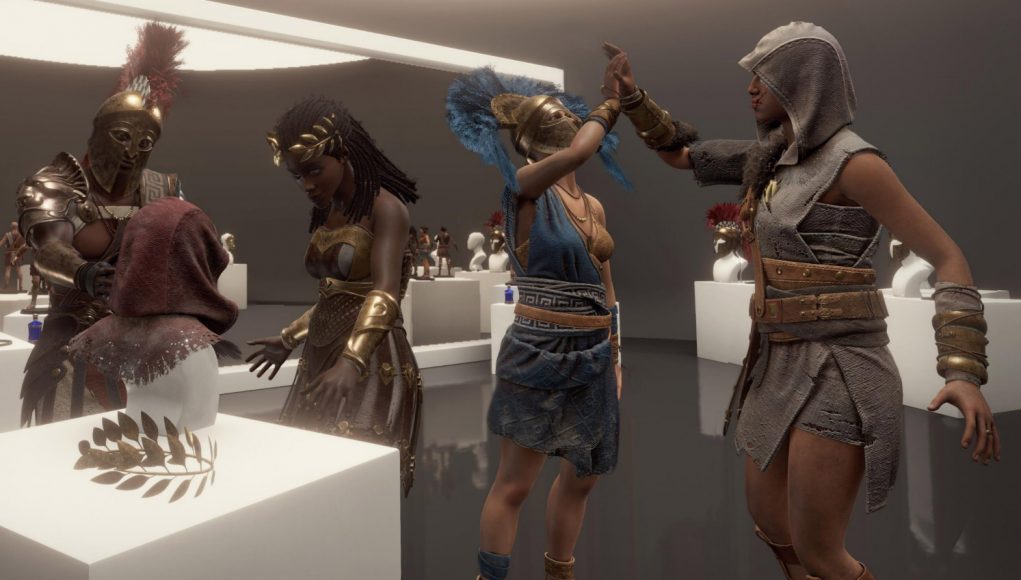While Ubisoft’s best known VR content has been its pioneering work in the consumer in-home space, another part of its business focusing on VR escape rooms has quietly become one of the most widely distributed in the industry, the company said this week.
Ubisoft has been investing in VR development early-on with games like Eagle Flight (2016), Star Trek: Bridge Crew (2017), Space Junkies (2019), and more. And while their in-home content is among the most recognizable of their VR projects, another portion of the company has been doing pioneering work of its own in the out-of-home (AKA LBE) sector.
Spearheaded by the company’s Blue Byte Düsseldorf studio, Ubisoft has released two games built for LBE under the Ubisoft Escape Games brand: Beyond Medusa’s Gate (2018) and Escape the Lost Pyramid (2019), both set in the Assassin’s Creed universe.
Making a distinction between VR content available to in-home consumers and that which is only available at out-of-home locations, Ubisoft Escape Games Executive Producer Cyril Voiron confirmed to Road to VR that the studio’s LBE content is operational in 240 locations across the globe, a “market leading” position, he said.
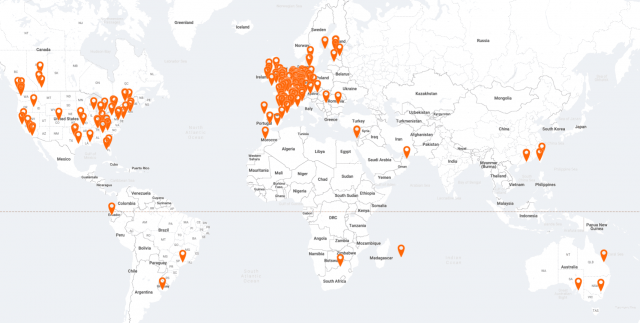
In a presentation at XRDC 2019 this week in San Francisco, Voiron spoke to the studio’s development approach for VR LBE content.
Designing for the Mainstream
As the name implies, Ubisoft Escape Games VR experiences are built as virtual reality ‘escape rooms’ more so than traditional VR gaming content. Rather than being built for VR players in mind, the experiences are designed to cater to a mainstream audience, most of which have never tried any sort of VR before. This is done to make the content highly accessible, similar to real escape rooms, which typically can be enjoyed by customers across a wide range of ages and physical abilities.
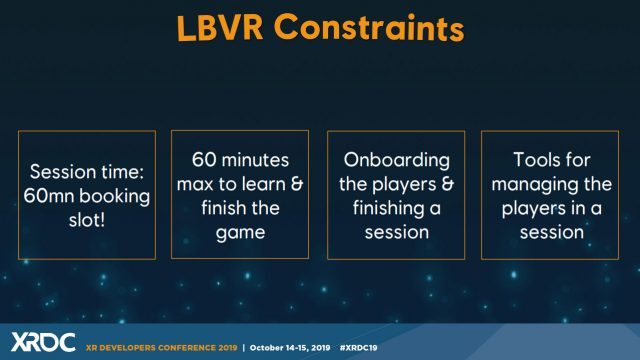
The experiences are also specifically designed around two or four players, Voiron said, and built so that each player must contribute to the success of the puzzle, preventing any one player from storming through everything without teamwork. This was all part of the Blue Byte team’s philosophy of designing for “what you feel, not what you see;” in particular, the team wanted every player coming out of the experience to feel like they made a meaningful contribution and had a story to share about the role they played in solving the escape room.
Another part of the core philosophy in designing the virtual escape rooms was giving players virtual experiences of things they couldn’t do in their home, like rock climbing or seeing environments of massive scale, as well as designing the experience to be as natural and intuitive as possible, Voiron said. That means simple mechanics like team communication, bow shooting, climbing, and only grabbing objects (no other button or thumbstick use).
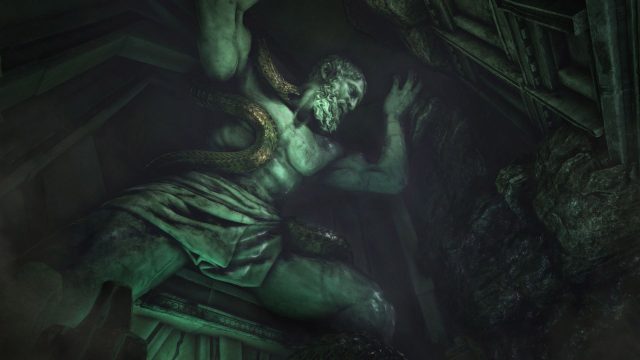
All of the Ubisoft Escape Games experience are built around natural room-scale locomotion (though Voiron added that an optional teleport system was added to allow the game to operate in locations with smaller footprints). The experiences are designed with moving virtual platforms, so that they can move the players virtually over a larger distance than would otherwise be possible within the physical space.
Iterating on Feedback
Though the experiences are built for two and four players, Voiron added that the escape rooms were initially designed to split players up at different points and then gradually bring them back together into a group. This was to facilitate a feeling of space and separation between players, but ultimately feedback indicated that players preferred to stay together as a group. On that feedback, the latest escape room still separates players for some intrigue and use of the virtual space, but Blue Byte learned that allowing players to maintain line of sight (even from a distance) and continue to be able to speak to each other helped them feel not alone or lost; especially useful when players can help each other figure out what to do if they get stuck.
Voiron noted the challenge of getting customers who aren’t familiar with VR into the headset so that they can really understand what kind of experience they’re signing up for. To solve this, he recommended that the clients operating a VR escape room should steer clear of presenting it as a video game, and instead focus on marketing the experience that players would embark on.
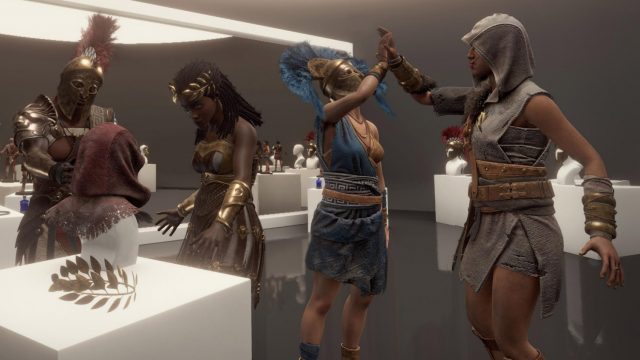
As many players of the Ubisoft VR escape rooms may have never tried VR before, the team wanted to show them right away that VR is different than what they would expect from a traditional video game. This was done by giving users full-body avatars and mirrors right at the start so they can see themselves embodying those avatars. Voiron said this quickly ‘clicks’ with players, especially thanks to the accessories that they can use to change their look. He suggested that LBE clients could even set up a headset in their lobby and let users briefly look at themselves in a virtual mirror to understand what the virtual reality experience is like.
An important theme of Voiron’s presentation was that the studio was carefully monitoring player and client feedback and using it to iterate and improve the experience. One of those major changes was lengthening the average time to complete the experience so that players felt they got more value from the cost of admission. In the studio’s first VR escape room, Escape The Lost Pyramid, the average completion time was 44 minutes; in the followup experience, Beyond Medusa’s Gate, they managed to increase the average to 54 minutes.
The Next Ubisoft VR Escape Room in 2020
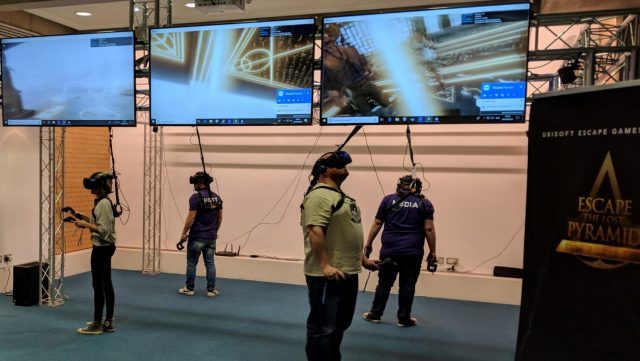
Voiron said that the Ubisoft Escape Games team is set up as a small and agile startup-like group within Ubisoft Blue Byte. Production on the first project started in early 2017; after the concept phase, 16 developers built Escape The Lost Pyramid which launched in mid-2018. The next project, Beyond Medusa’s Gate, had a 20 person team and launched in mid-2019.
Voiron shared that the studio’s third (and so far unannounced) project will have the largest team yet, with 23 developers, and is set to launch in Spring 2020.

